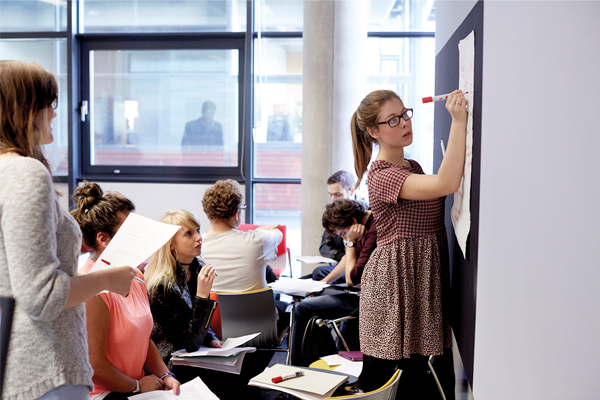Module Overview
In this module, students can develop their skills of identifying, searching, critically evaluating and synthesising academic literature, as well as the skills needed to understand and apply this knowledge to developing their own research. The module focuses on critically evaluating research literature in various areas of educational studies and around students' area of research in particular. The module is intended to help students focus on their study and situate it within the wider field of educational research.
Module Overview
This module aims to provide students with the necessary skills and knowledge of educational research in preparation for their postgraduate research which is the final part of the Master's in Education Programme. The module introduces students to research methodologies and methods of conducting empirical social research in the field of education and the challenges associated with it.
Module Overview
This module takes an in-depth view into school bullying dynamics and evidence-based practice that seeks to address said phenomenon. Causes and consequences of bullying, types of bullying, different roles students and staff play, and cultural considerations will be examined. Students will be expected to engage with literature, actively engage in discussions, and to take into consideration different aspects of bullying-related situations to come up with potential solutions. At the end of the module students will have a good understanding of the inner workings of bullying situations, how to support students, and available resources to address bullying.
Module Overview
This course explores the relationship between social justice and education. It introduces conceptual tools for identifying and challenging injustices in educational contexts, and strategies for developing knowledge, methods and skills for creating social just learning practices and environments. Education is a powerful activity and institution. Its importance lies not only in its centrality to national and international policy, but in the widely held belief that education has the capacity to liberate individuals, advance social flourishing and equality, and enable meaningful participation in social and political life. Yet educational practices and systems can also disempower people, reproduce structures of inequality and perpetuate discriminatory and oppressive social relationships. Making sense of the complex relationship between education and social justice is therefore an essential capability for educators. This course aims to provide students with resources to critically assess the personal, social and political implications of diverse educational theories, practices, policies and institutions, and to cultivate practices which promote social justice in your own context. Themes may include theories of social justice in education; the politics of educational policy and reform; the relationship between education, state, market, family, work and social movements; decolonisation; identity politics and intersectionality; and approaches to social justice in pedagogy, curriculum and educational governance.
Module Overview
This module will explore educational management and leadership with particular reference to the organisational and operational aspects of educational institutions. It is divided into three related parts. The first part analyses the organisation, structure and culture of educational institutions drawing upon organisational theory, cultural analysis and the use of metaphor. The second part explore the nature of leadership in educational institutions, a complex and contested concept. Particular emphasis is placed on transactional, transformational and constructivist leadership and leadership for learning. The third part provides an opportunity to critically consider some key issues in educational leadership and management including the nature of learning organisations, leadership for professional development and leading educational settings in challenging circumstances.
This module also is approved to be delivered as a standalone short course.
Module Overview
This module locates Education within Gender and Development frameworks. Students undertaking this module will be supported to think about people’s intersectional gendered experiences of education in global contexts through the theoretical and applied lenses of Gender and Development theory. In so doing, we will consider development and change in education in local and global contexts through applied case study approaches and gendered policy analyses.
Module Overview
You will examine the roles media and communications play in our understanding of each other’s cultures and ideologies and our global society. You will also consider the role of the media in shaping social interactions, both personally and as communities, with your own lived experience forming an integral part of your study of global media.
Module Overview
This module examines the role of language(s) in education. Students will explore a series of topics across the module and will reflect on their own experiences of education and how these issues apply. Through this, they will develop a critical understanding of the central role of language(s) in education and the potential (and varied) impact of linguistic issues such as: endorsing multilingualism, linguistic hegemony and language loss. Students’ own linguistic experiences will be drawn on as they become critical, language-aware scholars of education across this inter-disciplinary module.
Module Overview
This module is designed to provide students with core knowledge, understanding and skills of mentoring and coaching within an educational context. Mentoring and coaching in education explores, critiques, and critically evaluates key concepts, theories, practices, models, frameworks, and approaches to mentoring and coaching. Students will develop a deeper understanding of mentoring and coaching in education through a critical review and critique of the literature, and an evaluation of the empirical and practice-based research. The students will develop insights into the issues, challenges, and research evidence-base of mentoring and coaching in enhancing professional practice. Students will be supported in developing their professional practice and deepening their skills through critical reflections, interactive seminars, critical writing and debating a repertoire of mentoring and coaching models, theories, programs, and frameworks. The module will investigate the research evidence-base of mentoring and coaching in education with a particular focus on impacts and outcomes for participants and organisations.
Module Overview
Students will focus on critically exploring issues related to policy and practice for SEND in both primary and secondary schools and the materials studied can be extended to an adult population. The module also reflects on international initiative and explore the impact that they have on current policy.
Module Overview
This module will reflect the dynamics of STEM education in the modern world, enabling students to reflect on changing theories and practices in STEM in educational settings. It will critically examine STEM education and the part it plays within educational settings, including schools and informal learning environments. Students will have the opportunity to analyse particular areas of STEM education in depth that will allow them to reflect and consider the implications of theory on practice. The module will offer students the opportunity to examine historical and political aspects of STEM education through literature and practice.




